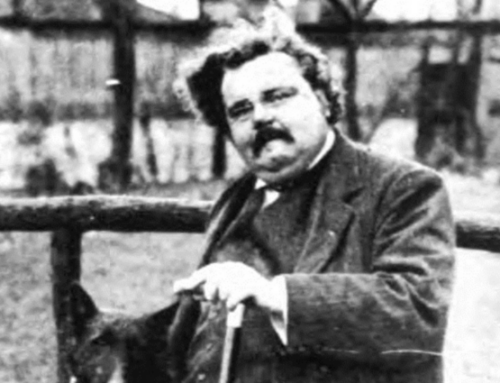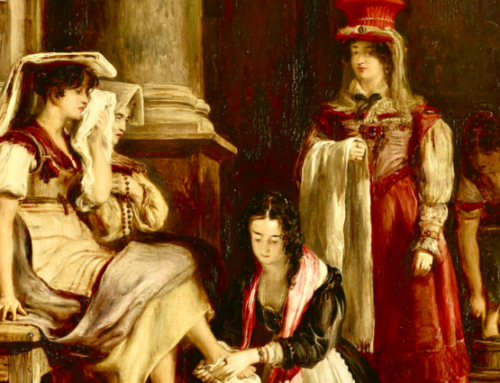The lack of any serious communal ascetical practices during Lent and throughout the year is one of the defining weaknesses of modern Christians. What the Catholic Church and various Protestants need is a return to real fasting that is accompanied by both almsgiving and attention to prayer.
 What are you giving up for Lent? This is the question Catholics and those Protestants who observe the penitential season preceding Easter are asking. In one sense, it’s a sadness that such a question has to be asked. Older Catholic traditions and liturgical laws didn’t only prescribe the season as penitential in a general way. Instead, they asked for abstinence throughout the week and asked for fasting on every Wednesday and Friday of Lent. Older Catholic Lents looked a lot more like the Orthodox Great Lent with its rigorous divesting of most of the things that make this life delicious in order that we may teach ourselves to delight forever in the Bread of Life. They were meant to imitate Jesus himself.
What are you giving up for Lent? This is the question Catholics and those Protestants who observe the penitential season preceding Easter are asking. In one sense, it’s a sadness that such a question has to be asked. Older Catholic traditions and liturgical laws didn’t only prescribe the season as penitential in a general way. Instead, they asked for abstinence throughout the week and asked for fasting on every Wednesday and Friday of Lent. Older Catholic Lents looked a lot more like the Orthodox Great Lent with its rigorous divesting of most of the things that make this life delicious in order that we may teach ourselves to delight forever in the Bread of Life. They were meant to imitate Jesus himself.
Today’s Latin Rite Catholic is faced with the rather pathetic request for two days of fasting (Ash Wednesday and Good Friday), defined as one full meal and two smaller meals that don’t add up to a full meal together. Most Protestants are not asked to fast at all in a corporate fashion. Jesus said, “When you fast,” while we take an “if you’re into that sort of thing” attitude.
More rigorous asceticism probably takes place because of membership in a Lifetime Fitness than membership in the One, Holy, Catholic, and Apostolic Eternal Lifetime Health Club.
Of course, I’m partially joking. True bodily discipline that helps body and soul is only possible with an undergirding of prayer. But it should be a bit disturbing to us that secular people in yoga pants often assume and are accorded more authority than the robed figures anointed not by sweat but by blessed oil and the Spirit are. It is not surprising, however, because people respond to those who ask more out of them.
The lack of any serious communal ascetical practices during Lent and throughout the year is one of the defining weaknesses of modern Christians. We do so little because so little is asked of us. What the Catholic Church and various Protestants need is a return to real fasting that is accompanied by both serious almsgiving and serious attention to prayer. We Catholics and Protestant Christians need to return to the notion of a Great Lent that the Eastern Churches still have. We will be better off if there are goals that seem daunting even as we can acknowledge that not everybody will be able to do as much or give up as much as others.
What we have now is what we might call the Little Lent during Great Lent: the situation in which the question that begins this essay is asked. What are you going to do for Lent? It’s a choose-your-own-penance adventure, and its very vagueness will result in many people shucking off any kind of planned penance or simply choosing something that’s easy. This isn’t a judgment of others’ penances; it’s a report on what people of serious minds have told me: “I’d do more if the Church asked.”
If the Church said, “Here are Twelve Rules for Lent,” I believe she would see more of the faithful seeking transformation from Christ as they are from Jordan Peterson of Twelve Rules for Life fame. Yet I believe that even if I were to get my wish for an all-inclusive, irritating, authoritative, and communal penitential forty days for one to two billion people—Great Lent!—there would still be a need for the Little Lent of personal penances, chosen to thwart individuals’ own little idolatrous addictions that can’t be included even in the most detailed group plan. Twelve rules for Lent would be cool; 967 rules would not be. There will always be a need for personal battles with our own household gods. Many of the official food penances don’t strike some people the way they do others for various reasons. It’s not a reason not to do them, but it is a reason to think of other acts that will prove and build our love by allowing us to refrain from or give away manifestly good gifts in order to remember that their Giver is himself the true Gift.
We will probably seem a bit odd to others if we really think hard about what a good penance might involve. Christian writers who talk about asceticism have perhaps always sounded slightly crazy. St. Neilos the Ascetic, a fifth-century abbot near what is now Ankara, Turkey, wrote about what he thought was the great challenge to those seeking to follow Christ:
A great variety of different foods overthrows the fortress of the virtues and razes it to the ground. Sauces and condiments are the siege engines that batter against virtue and overthrow it, even when it is already firmly established.
Man’s enemies: the World, the Flesh, and Worcestershire sauce.
But what St. Neilos is warning against is pretty easily understood. Gluttony can take the form of excessive eating but also the form of a kind of delicacy in which we are dependent on little things. I’m thinking this year of cutting out hot sauce myself, a necessary accompaniment to tacos, chips, eggs, soups, and a variety of other foods. I like the nationally-known-and-distributed Tabasco and Cholula, but local favorites such as Isabel Street Heat’s Chipotle and Ghost Pepper sauces give me pleasure, too. Just writing this is giving me a craving for some Minneapolis-made Cry Baby Craig’s pickled habanero and garlic sauce.
Yet they are not necessary to my existence or happiness. Lots of aspects of our lives in the modern world are like this. Pleasant, pleasurable, good little things that most people won’t notice. Perhaps it’s time watching funny little videos or scrolling through memes. Maybe it’s the “me time” that we claim from our spouse or our children. Maybe it’s the money that we could spend on ourselves but might be better donated to someone who could use it more. These are all things for which we can exercise what Chesterton calls the test of any philosophy: gratitude. But they are things that we can come to depend upon in idolatrous ways that we don’t notice until we are deprived of them involuntarily. Giving them up so that we can unite ourselves to Christ who gave up all for us can be truly a big deal. The twentieth-century Benedictine Hubert Van Zeller observed that “it is not the penance that appears outwardly as the most heroic that is the most pleasing to God, but the penance that is secret and the most humbling.”
We need reformers who will call for a Greater Lent. But we will never leave behind the need for our own little Lents in which we strip away our little idols so that we can discover how good it is in proper perspective.
Give and give up boldly this Lent. And, please, watch your ketchup consumption.
The Imaginative Conservative applies the principle of appreciation to the discussion of culture and politics—we approach dialogue with magnanimity rather than with mere civility. Will you help us remain a refreshing oasis in the increasingly contentious arena of modern discourse? Please consider donating now.
The featured image is courtesy of Pixabay.







Too hard! Let me have my comforts instead! ha ha
A perfectly on-point essay for Ash Wednesday. Thank you.
Thank you for this post – truly thought-provoking. I will approach lent differently now.
I just turned 77, but had already decided to return to Lenten fasting. Abstinence was never a problem (we love fish) but fasting…..not only from food, but from little things that get in the way of prayer life: internet, daydreaming, procrastination, and other distractions. I’m finding it also makes keeping up with my prayer routine much, much easier and lovely.